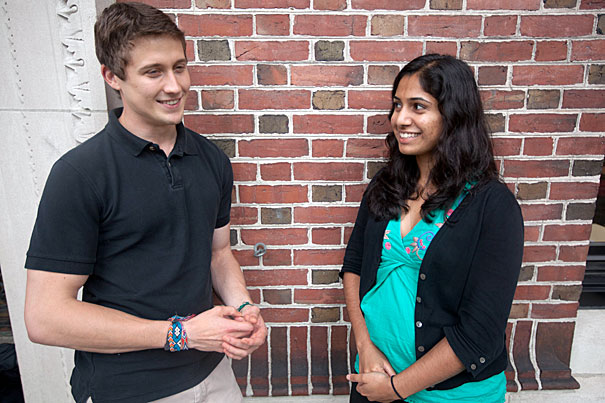
Harvard Medical Students Divya Mallampati and John Heintz took a class called “Clinical Topics in Global Health,” which stretched their creativity and made them think critically about their futures in the field.
Kris Snibbe/Harvard Staff Photographer
Study locally, think globally
A new class helps train future physicians in global health
It will be news to few when we say that there is a veritable tsunami of youth interested in global health. In universities across the country, students are seeking out classes, organizations, and opportunities to learn, discuss, and act. Harvard is, of course, no exception.
As Harvard Medical School (HMS) students, we often get emails about speaker events, attend student gatherings about global health, or talk with professors about their latest research. For both of us, it seems as if most of our free time (and then some) is spent negotiating how we can engage in these exciting opportunities. Like many of you, we not only care deeply about grave, unjust inequities in our world but want to build lives dedicated to addressing these complex issues.
What if we were to tell you that, despite being inundated with the discourse of global health, we’ve still seen educational gaps? Perhaps we’re critical or hard to please; certainly we’re restless. The truth is that at HMS there is a preponderance of opportunities that focus separately on theory, practice, and discernment — three necessary areas in the development of global health professionals. Lectures educate us. Organizations and projects enable us to engage as students. And our impressive classmates and mentors empower to us consider our roles as physicians. All occupy different spheres and can sometimes fragment the experience.
Enter, a new elective at HMS called “Clinical Topics in Global Health.” Having recently finished its second year, this class was a critical merger of these three areas that we thought necessary for budding physicians. Taught by Patrick Lee, a clinical instructor in medicine, and Brett Nelson, an assistant professor of pediatrics, the elective united a group of students diverse in both prior experience and stage of education. Our classmates ranged from fellow first-years to a third-year resident to an experienced clinical psychologist. As we were instructed on the first day, we were to be our own teachers and mentors, as well as colleagues — a lesson we quickly learned to appreciate.
Over two months, we encountered a wide range of issues, such as models of health care delivery, mental health, primary care, oral health, and cancer. Each topic was explored through several lenses so we could understand the current context of the issue, relevant clinical skills, and the inevitable challenges of implementation. Far from simply discussing topics, the class was hands-on and entertaining. We dove into the first week by resuscitating plastic “infants” replicating acute respiratory distress. Later we proceeded to learning case management for HIV/TB patients, recognizing infectious parasites under a microscope, and performing ultrasounds on each other.
Through these clinical applications, we constantly stretched our creativity as we considered how we could provide quality medical care with severely limited resources. Who knew a condom not only can prevent pregnancy or sexually transmitted infections, but when inflated with water can also stabilize a post-partum hemorrhage, buying a woman critical time to make it to a medical center?
One of the most unusual facets of the class came in the final evening. We sat with a panel of global health professionals and were able to ask some of the most personally important questions, ones that we frequently ask each other and that lace our conversations about our futures. How do I engage in global health and yet have a family? How do I take care of myself? How can I balance my time between living overseas and in the United States? While there is no correct answer, discussions like this are important for the next generation of global health care professionals, filled with unguided uncertainty yet limitless potential.
It would be preposterous to claim that we covered every clinically relevant issue that challenges humanity around the world. This class, however, came at a critical moment for some young doctors interested in global health. At a time when we are beginning the process of forming our professional lives, we come out of this class with a broadened ken and clearer conception of how we can be responsible and more effectively leverage our roles. For Divya, every day in rural Liberia this summer working on a women’s rights project is a constant reminder of the lectures on maternal mortality and innovation in resource poor settings. For John, working on an ethnography of managed care and skin cancer in Colombia has given him an arena in which to apply the classes on non-communicable diseases as well as begin to build a long-term engagement in the country.
Amid the fertile landscape of global health here at Harvard, this class serves as an interesting model. For us, the gap between student and physician — the global health physician in training — is narrower.
If you’re an undergraduate or graduate student and have an essay to share about life at Harvard, please email your ideas to Jim Concannon, the Gazette’s news editor, at Jim_Concannon@harvard.edu.





